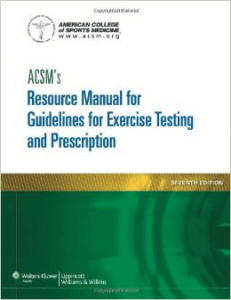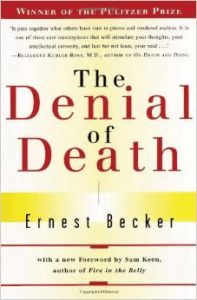Strengthlab on Aug 23rd 2015 StrengthLab Thoughts
This is a professional book that any health and fitness “expert” should know and study slowly; every time there’s a new edition, I buy it, and I read it carefully – ALL 900 pages!
ACSM’s Resource Manual for Guidelines for Exercise Testing and Prescription was created as a complement to ACSM’s Guidelines for Exercise Testing and Prescription and elaborates on all major aspects of preventative rehabilitation and fitness programs and the major position stands of the ACSM. The 7th edition provides information necessary to address the knowledge, skills, and abilities set forth in the new edition of Guidelines, and explains the science behind the exercise testing and prescription. ACSM’s Resource Manual is a comprehensive resource for those working in the fitness and clinical exercise fields, as well as those in academic training.
http://www.amazon.com/Resource-Guidelines-Exercise-Prescription-Guidlies/dp/1609139569/ref=sr_1_sc_1?ie=UTF8&qid=1408934347&sr=8-1-spell&keywords=acsm+and+resource+manual+and+guideline

Strengthlab on Aug 23rd 2015 StrengthLab Thoughts
Winner of the Pulitzer prize in 1974 and the culmination of a life’s work, The Denial of Death is Ernest Becker’s brilliant and impassioned answer to the “why” of human existence. In bold contrast to the predominant Freudian school of thought, Becker tackles the problem of the vital lie — man’s refusal to acknowledge his own mortality. In doing so, he sheds new light on the nature of humanity and issues a call to life and its living that still resonates more than twenty years after its writing.
http://www.amazon.com/Denial-Death-Ernest-Becker/dp/0684832402/ref=sr_1_1?ie=UTF8&qid=1440346144&sr=8-1&keywords=denial+of+death

Strengthlab on Aug 23rd 2015 StrengthLab Thoughts
Being young is frequently filled with a bunch of wasted time and very little thought for others; with concerted effort, being older can be filled with “thoughtful” thoughts, knowledge and new skills, time better spent, not wasted, closer friends and more concern for others and things that matter. Decline and decay? Nop, perhaps just better!
Strengthlab on Aug 23rd 2015 StrengthLab Thoughts
Improvement is a slow and steady race in most cases, making a skill or behavior permanent, especially under stress, takes time and practice. Eventually our neurons wire together and fire together without our conscious thought, at this point we have learned a new skill or mastered a new behavior.
Slow to pick new things up? No problem. The “tortoise” tends to retain what they’ve learned long-term better and frequently to even know it better than the “hare” (sometimes the hare moves on too quickly or doesn’t learn it well enough to make it permanent).
Strengthlab on Aug 23rd 2015 StrengthLab Thoughts
Most aspects of our personality (thoughts and behavior) are modifiable; we can get worse or we can get better at something. Why not improve? If we have a personality trait or characteristic that is too weak, or too strong, we can improve it, or we can ignore it, allowing it to stay the same or even get worse. When things don’t improve that need improving, or even get worse, we suffer and so do those around us. If we tend to get angry too quick, or fail to listen well when someone else is speaking, we can certainly improve it. Don’t know enough about something, we can learn more about it and apply it. We are not a “fixed” and “permanent” personality, we are constantly changing, why not work to make these changes positive and constructive rather than negative and destructive?
Progress through personal improvement is certainly worth our time; and others will benefit as well!

